|
International Perspectives - December 20, 1999
Anne D. Picker
International Economist, Econoday
Countdown to the New Year
| INTERNATIONAL PERSPECTIVES WILL NOT BE PUBLISHED NEXT WEEK IN OBSERVANCE OF CHRISTMAS. WE WILL RETURN WITH A NEW REPORT ON JANUARY 3RD. THE ECONODAY STAFF WISHES YOU A HAPPY HOLIDAY SEASON. |
Financial Markets
As the last full week of trading wound down, traders were taking the opportunity to put their portfolios in shape for the New Year. Generally, the holidays bring a decline in volume, which makes markets more volatile because a small trade can have a larger impact on the averages than normal.
Equities
World markets were mixed last week, with the Toronto Stock Exchange Composite 300, the Mexican Bolsa and the German DAX indexes closing at record highs for the year.
| Selected World Stock Market Indexes |
| Index | 17-Dec | 1999
High | 1999
Low | Week %
Change |
|---|
| Asia |
| Australia | All Ordinaries | 3138.10 | 3145.20 | 2804.80 | 0.57 |
| Japan | Nikkei 225 | 18095.12 | 18914.50 | 13232.70 | -0.97 |
| Hong Kong | Hang Seng | 15986.35 | 16380.21 | 9076.33 | -2.40 |
| S. Korea | Korea Composite | 949.26 | 1027.93 | 498.42 | -6.77 |
| Singapore | Straits Times | 2372.47 | 2235.82 | 1286.56 | -0.96 |
| Europe |
| Britain | FTSE 100 | 6724.60 | 6742.20 | 5770.20 | -0.22 |
| France | CAC |
5502.40 | 5468.05 | 3958.70 | 0.39 |
| Germany | XETRA DAX | 6353.90 | 6353.90 | 4668.50 | 4.20 |
| North America |
| United States | Dow | 11257.43 | 11286.18 | 9120.70 | 0.29 |
| Canada | TSE Composite 300 | 8098.19 | 8098.19 | 6180.30 | 1.81 |
| Mexico | Bolsa |
6959.35 | 6959.35 | 3300.42 | 2.62 |
Europe
The Frankfurt DAX outperformed other market indexes, despite a hesitant finish to the week. The DAX jumped 256 points or 4.2 percent to finish the week at 6354. The index closed at three new highs during the week on good German economic data. Sharp increases in telecommunications and high technology stocks in the wake of Vodafone AirTouch's hostile bid for Mannesmann also drove the market higher. Later in the week markets began their traditional slow down as investors abandoned stock picking for shopping. The Y2K computer threat was expected to hit trading volumes but so far the opposite has happened.
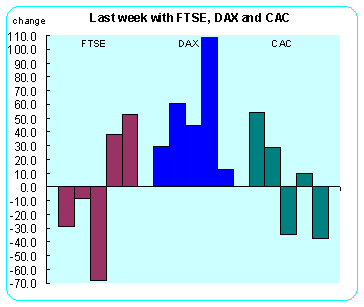
The Paris CAC-40 index shrugged off some profit taking to close the week 21 points or 0.4 percent higher at 5502. But turnover was below par suggesting business may have started to slow down ahead of Christmas. During the week, the CAC did claim its 34th record close of the year.
The London FTSE 100 snapped three days of losses on Thursday on a burst of strength in many of the leading cyclical stocks, principally the oil majors and mining shares. The initial impetus came from the positive results from the U.S. markets. News of a smaller than expected increase in UK November retail sales also helped because it might reduce the pressure for another interest rate increase by the Bank of England. The FTSE 100 continued its winning ways on Friday when it narrowly missed setting a new closing high because, in part, of the volatility associated with the expiration of December futures and options. However, New York's optimism was contagious and the FTSE closed the week with its strongest upward thrust of the week, gaining 53 points. The index however, finished the week down 15 points at 6725.
Asia
The Nikkei closed down 177 points or almost one percent last week to finish at 18095. Several reasons contributed to the decline. Japan's quarterly Tankan survey, which measures business sentiment, failed to impress investors. The disappointing Tankan results coupled with earlier negative gross domestic product data particularly hurt cyclical stocks. Foreigners were net investors in Japanese stocks for 43 of the 47 weeks ending December 10, according to the Tokyo Stock Exchange.
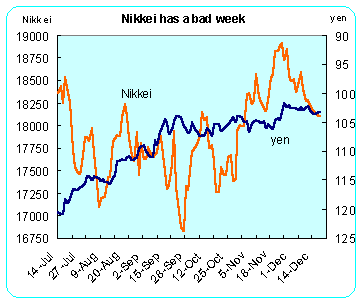
As the year end approaches, caution is putting a damper on activity. A wait and see attitude prevails amid spreading concerns that Y2K computer problems could occur at the turn of the year. Investors were also encouraged to unwind positions and increase cash for the year end closing of their books.
Hong Kong Hang Seng index was lower on selective profit taking by institutions before they close books for the year end. The index closed the week at 15986, down 394 points or 2.4 percent. Profit taking was notable after the prior week's huge gains and market players locked in gains.
Currencies
Last week was in effect the last full week of real currency trading for the year and traders are focused on their positions going into holiday break. With some millennium bug fears still circulating in the markets, shifts of opinion about the millennium hedge of choice may be the only thing that can generate substantial price action. So far the consensus seems to be that the dollar has benefited most, certainly against the euro. It's a thinning market because of the year end and Y2K.
Yen
The yen fell against the dollar and the euro after the Tankan report showed confidence among large Japanese manufacturers isn't rising as much as expected. Analysts had the impression that while Japan's growth isn't tailing off, it still isn't gaining much strength either. Foreigners' repatriation of funds has helped push up the dollar. However, dollar rallies have been stifled because Japanese companies that sell their products overseas have seized on the dollar's recent strength to take money home. At the same time, international investors are buying the currency to pay for Japanese stocks. The combination has propelled the yen's gains. That surge has continued despite repeated yen selling interventions in the currency markets by Japanese authorities since June.
Euro
The euro rode a roller coaster last week. The dollar's strength was helped by strong performances of both the Dow Jones Industrial Average and the Nasdaq. Again, as the week progressed, volumes became thinner and trading more volatile. Analysts remain puzzled as to why the euro has not benefited more from the steady stream of optimistic economic data. The euro made strong gains in early trading in Europe, which were dented or reversed when Wall Street came on line later in the day. Some analysts suggest the pattern meant the "good news" story about the Euroland has not yet percolated through to traders based in the United States.
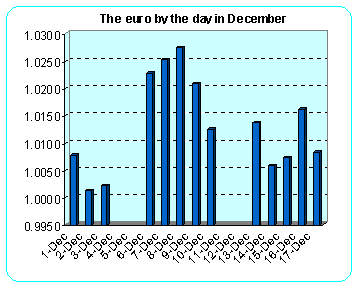
The euro was tarnished after local reports underscored what some economists consider an unfriendly business climate in Germany and France, traders said. Companies in western Germany will relocate as many as 40,000 jobs abroad each year in the next three years as the nation faces high domestic labor costs, according to a report in the German business daily Handelsblatt.
With many traders away from their offices for the year end holidays and some investors unwilling to place big bets before the end of the year, smaller transactions could have a larger than usual impact. The euro erased gains against the dollar despite the evidence that although growth is picking up in Europe. However, analysts think that the growth won't be strong enough to prompt international investors to favor the common currency over the dollar. Climbing U.S. stocks have bolstered demand for the dollars needed to buy them, further diminishing the euro's allure.
Indicator scoreboard...
Britain - Watching the indicators that the Bank of England watches...
Data released last week covered three critical areas of concern for the Bank of England's Monetary Policy Committee. They are unemployment, earnings and prices, all of which all can contribute to economic over heating.
The November unemployment rate fell to 4.1 percent - its lowest level since spring 1980. The International Labor Organization unemployment total, which includes people not eligible for benefits, also dropped. Although the claimant count drop was spread geographically it was concentrated among men. Unemployment has continued to fall even though the economy slowed in the first half because of the after effects of the world financial crisis.
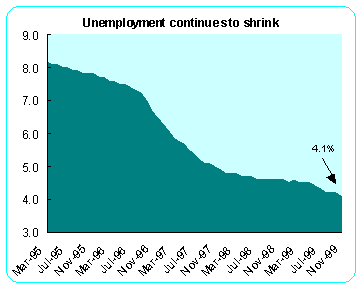
Average earnings, which are closely watched by the Bank of England's Monetary Policy Committee for signs of inflationary wage pressures rose 4.9 percent in October when compared with last year. The MPC's target is 4.5 percent. The number was higher in the private sector where earnings grew by 5.1 percent. In the public sector the figure was 3.9 percent. Earnings grew by 4.2 percent in manufacturing because of overtime and bonus payments as output rose while jobs continued to be cut. There were also increased bonus and overtime payments in the service sector.
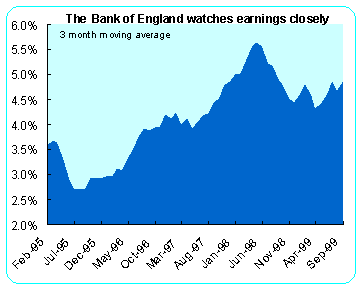
November Retail prices excluding mortgage interest payments (RPIX) rose 0.1 percent on the month, which left the annual rate the same as October's at 2.2 percent and below the government's inflation target of 2.5 percent. This is the Bank of England's key inflation indicator. The retail price index (RPI) also rose by 0.1 percent on the month but 1.4 percent when compared with last year.
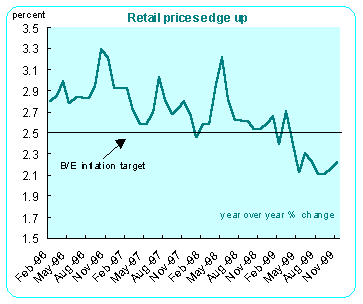
November producer input prices climbed at the fastest rate since September 1995. Seasonally adjusted input prices shot up by 1.7 percent on the month and 9.1 percent when compared with last year. The jump was mostly driven by a record jump in crude oil prices - up 10.0 percent on the month and by 123.3 percent on the year (not seasonally adjusted).
November retail sales volumes continued to climb with the underlying rate of growth maintaining a similar pace as in recent months. Retail sales rose by 0.2 percent on the month and 4.1 percent on the year.
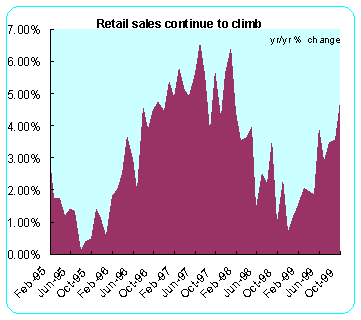
Other indicators
Germany
The Ifo Institute's west German business sentiment index surged to 98.9 in November, outpacing by a wide margin all expectations and confirming that the German economy will start the new millennium on a strong note. This is the highest index level since May 1998. Sentiment on both current conditions and future expectations improved. The benefits from continued euro weakness as well as improved prospects for the domestic economy contributed to the jump. East German business sentiment also improved, rising to 104.0 from 103.4. The improvement in east German sentiment is further sign of an improvement in the region, following recent data showing an improvement in manufacturing orders, industrial production as well as a decline in seasonally adjusted unemployment.
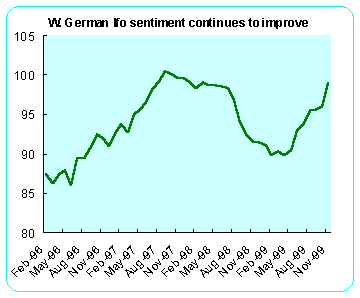
October retail sales improved adding to the evidence that the German economy is improving. German seasonal and calendar adjusted total real retail sales, including auto and petrol stations sales, rose 3.7 percent on the month and were up 2.3 percent compared to a year earlier.
Italy
October industrial production rose a seasonally and workday adjusted 0.4 percent and 2.5 percent when compared with last year. Overall production is rather flat with only very slight signs of recovery.
France
October merchandise trade surplus contracted slightly in seasonally adjusted terms from the high September level. However, in unadjusted terms, the October surplus surged to Ffr20.502 billion from Ffr12.872 billion in September. A rebound in Airbus sales coupled with rising capital goods exports along with continuing growth in semifinished goods and energy exports contributed to the 1.2 percent monthly rise in seasonally adjusted exports. Imports rose somewhat faster with a 1.5 percent gain. Consumer and especially semifinished goods imports continued to grow, while energy imports stabilized and capital goods and car imports declined.
Asia
Japan
Bank of Japan's Tankan Survey...
One of the key indicators that the markets watch for signs of life in the Japanese economy is the quarterly Tankan survey's confidence index among large manufacturers. The December index registered minus 17, an improvement over the minus 22 reading in September. The index has been steadily improving from a five year low of minus 51 in September 1998. However the last positive reading was more than two years ago. The Tankan report showed Japanese companies plan to reduce their capital spending, which underscores the still tentative nature of Japan's economic rebound. The survey asked 9,206 companies to say whether they think economic conditions are "good," "bad" or "so-so". The diffusion index measures the percentage answering good minus the percentage answering bad while discarding the so-so responses.
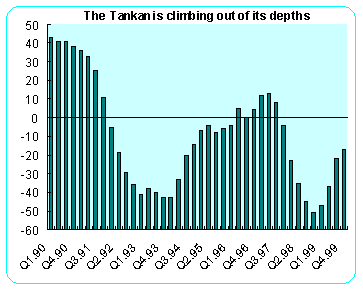
The improved number supports the consensus view that Japan's economy is continuing to recover, albeit slowly, after two consecutive years of contraction in 1997 and 1998. While the headline figure improved, the Tankan survey contained some evidence to support the negative view of the recovery. The closely watched plans for corporate investment in factories and equipment, which accounts for about 15 percent of national output, showed that big firms planned to slash capital spending by 10.8 percent in the year to the end of March. This is an even bigger cut than they predicted in the previous quarter. That suggests private demand is still weak in an economy that has been supported by heavy government spending using borrowed money.
October's industrial production index was revised down to a seasonally adjusted drop of 2.7 percent against the original 2.3 percent drop. In annual terms, the index was up an unadjusted 1.3 percent when compared with a year earlier.
Australia
Third quarter gross domestic product climbed 1.6 percent, the strongest quarterly growth since June 1997. Most sectors of the economy added to growth except net exports, which subtracted 0.4 percentage points, reflecting stronger import than export growth. Australia has registered over four percent year on year growth for nine of the past ten quarters. Analysts expect GDP to remain robust into 2000. Given these expectations, most analysts expect the central bank to try to slow the economy and head off inflation pressure by raising interest rates again early next year, The key overnight cash rate now stands at 5 percent.
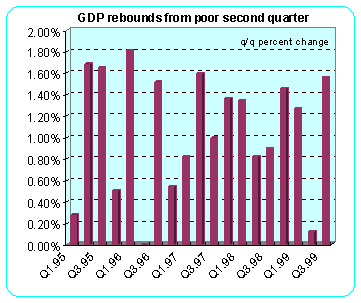
Americas
Canada
October factory shipments declined 0.7 percent because of production difficulties in the motor vehicle industry. Factory shipments were down in 13 of 22 major groups, representing 77.1 percent of the total. The largest contributor to the October drop was motor vehicles (-3.3 percent). However, gains in electrical and electronic products (+3.9 percent) and metal fabricating industries (+2.6 percent) helped mitigate the decline. Unfilled orders rose 1.8 percent for a sixth consecutive month.
The October merchandise trade balance rose to C$2.7 billion. Exports rose 1.2 percent while imports increased for the ninth consecutive month, climbing 0.7 percent. Despite volatility in the last three months, October's export level remained 7.9 percent higher than in October 1998. The trade surplus with the United States rose to C$5.091 billion in October from a revised C$4.825 billion in September. Canada posted a deficit of C$147 million with Japan in October, a decline from the revised C$156 billion deficit in the prior month. All other countries also showed a deficit.
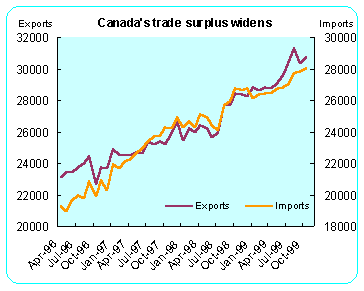
November not seasonally adjusted consumer prices were down 0.1 percent - the first decline since December 1998. Compared with a year earlier, Canada's CPI was up 2.2 percent. The CPI excluding food and energy was down 0.2 percent on the month and 1.6 percent higher than the year earlier reading.
Recap...
Good news about improving European economic growth continues to emerge. Germany, which accounts for about one third of the European Monetary Union, is showing continued signs of improvement despite delays in addressing its structural problems, especially in the labor force. Japan, however, still has a long way to go. The third quarter interruption to growth hopefully will be reversed in the fourth quarter.
Looking Ahead
|
Central Bank Activities |
| Dec 21 | United States | Federal Reserve Open Market Committee Meeting |
| Dec 21 | Japan | Bank of Japan Monthly Report |
| Dec 22 | Japan | Bank of Japan Minutes of December 12, 1999 Monetary Policy Meeting |
| Dec 22 | UK | Bank of England Monetary Policy Committee Meeting Minutes of December 9, 1999
|
|
The following indicators will be released this week... |
| Europe | | |
| Dec 20 | EMU | Money Supply (M3) (November) |
| Dec 21 | EMU | Harmonized Consumer Price Index (November) |
| UK | Retail Price Index (October) |
| Dec 22 | France | Industrial Production (October) |
| UK | Gross Domestic Product (3Q, 1999) |
| | Current Account (Q3, 1999) |
| Dec 23 | EMU | Trade Balances (October and November) |
| UK | Trade Balances (October and November) |
| Italy | Trade Balances (October and November) |
| Dec 24 | Italy | Retail Sales (October) |
| Dec 30 | France | Unemployment Rate (November) |
| Dec 31 | Italy | Gross Domestic Product (Q3, 1999) |
| Asia | | |
| Dec 20 | Hong Kong | Unemployment (November) |
| Dec 21 | Hong Kong | Gross Domestic Product (Q3, 1999) |
| Dec 23 | Hong Kong | Consumer Price Index (November) |
| | Retail Sales (October) |
| Dec 27 | Japan | Preliminary Industrial Production (November) |
| Dec 28 | Japan | Unemployment (November) |
| Dec 30 | Hong Kong | Industrial Production (Q3, 1999) |
| | Producers Price Index (Q3, 1999) |
| Americas | | |
| Dec 24 | Canada | Gross Domestic Product at Factor Cost (October) |
Release dates are subject to change.
For U.S. data releases, see this week's Simply Economics.
|












